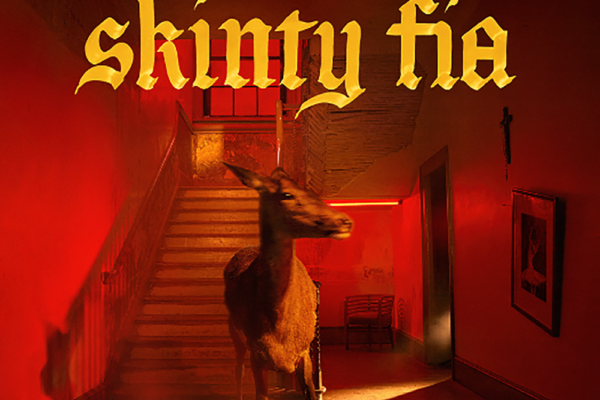The Cowboy, dying, shot in the chest,
Asked the stranger with dying breath
That the drum be played slowly,
And the fife played lowly,
For surely he must die;
That the name of his killer
Not be told to his grey-haired mother;
& that the cowboy she loved had died.
Covered in white linen where he did lay,
Shot in the chest and cold as clay,
On the Streets of Laredo is where he died that day.
There aren’t many bands that the average American will recognize as being from New Zealand. In the course of the last decade or so, both Flight of the Conchords and Lorde have gained some mainstream success, and before that Split Enz (yes, I’m spelling that right) and Crowded House hailed from the islands (Neil Finn is a songwriting powerhouse and his son Liam Finn standing proudly in his shadows). With each new album, Streets of Laredo, a band from Brooklyn by way of New Zealand, asserts themselves on that list.
They’re born out of the ashes of another New Zealand act, Elemeno P (which, according to a press release for Wild, was the highest selling native act before Lorde showed up). Dave Gibson (drums) left that band after three very successful albums and took flight to North America where he started the band with his wife and brother. This flight halfway across the world plays an important part in the musical stylings of Streets of Laredo. It’s not very hard to tease out Streets of Laredo’s Kiwi roots that simmer with a touch of Americana.
Their sophomore album, Wild (Oct. 21), is resonant of the North American pop scene over the last twenty years or so, recalling the pop vibes of bands like Stars and Broken Social Scene and Foster the People. The tracks, even when tackling dour topics (see the track “99.9%,” which handles the growing inequality seen on our shores, a heightened version of which exists in places like Brooklyn), maintain a sound appropriately compared to Foster the People’s “Pumped Up Kicks,” which juxtaposes a jaunty pop song with lyrics about a school shooting. Streets of Laredo handle the situation with more aplomb than that, announced to triumphs and fanfare “I don’t mind if you don’t mind.”
It’s hard to separate the Kiwi from the record, from the singing accents to the chanting at the beginning of “Hammer and the Nail;” a song that most ably combines a talking blues style melody over a happy-go-lucky chorus of background vocals. That brightness is a feature on most of the songs here. Most shimmer in a way different from your typical American rock band, saying something about American Pragmatism infecting even sound quality, or a Kiwi brightness of spirit. Given that the album was produced by John Agnello, a man who’s had his hands on both Dinosaur Jr. and Kurt Vile albums, there’s a good chance it’s a mixture of both.
Its one misstep on Wild is the song “Tunnel Vision,” which sounds like the musical version of one of those creative writing projects where you re-write a poem using the first line (if you take a creative writing class, you’re guaranteed to meet this assignment in the first month). The source text here being The Hollies “Bus Stop.” (This is, of course, not an indictment of theft, no matter how litigious and irresponsible American courts have become in terms of intellectual theft. Take for instance the industry stance against the Gaye/Williams-Thicke verdict.) Unfortunately for Streets of Laredo, “Bus Stop,” written by Graham Gouldman of 10cc, is such an iconic song of the British Invasion movement that it’s hard to not immediately want to listen to that song.
The album ends with “Gold,” a song specifically about being happy with what you got, and making gold with it. That even though you don’t make as much as the 1%, doesn’t mean you have to outwardly suffer for it (though, unfortunately many do suffer because of inequality, but that’s a topic too large for an album write-up). That just because you’re singing the blues, doesn’t mean that you have the blues. This philosophy, the enduring chipperness is insistent throughout Wild. Like the cowboys in the song they named themselves after, there is a sense of freedom to leave the dead behind.
*Our senior-writer asked Dave Gibson a few, brief questions in advance of their album release show at Brooklyn Bazaar, which you shouldn’t miss so get your tickets here.
PW: What is the musical collaboration like between the 6 members of the group?
Dave Gibson: The song ideas start a bit smaller, maybe with just one person. There are a few songwriters in the band that are very, very active. Then we take those songs and everyone really brings their magic to them in the live performance. The collaboration is good. The harder part is getting everyone together for band practice.
PW: How did starting in New Zealand’s music scene impact you as a band? How did moving to Brooklyn change your sound?
DG: Growing up in New Zealand, I think our background there definitely does inform our musical sound. We feel very much at home here now, but we’re from a place that is pretty much as different and as opposite as you can imagine. We’re from an isolated island, at the bottom of the planet, with roughly the same amount of people in our whole country as there are in Brooklyn. Such a different place, right? So that, coupled with this new experience and this new life that we have here in Brooklyn, has kind of meshed together and blended to bring out what our songs are about. But there’s always kind of songs about isolation, and about adventure, and about feeling kind of freaked out about being away from family and friends.
Article: Christopher Gilson with additions from Olivia Isenhart




